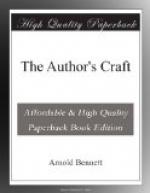III
When the author has finished the composition of a work, when he has put into the trappings of the time as much of his eternal self as they will safely hold, having regard to the best welfare of his creative career as a whole, when, in short, he has done all that he can to ensure the fullest public appreciation of the essential in him—there still remains to be accomplished something which is not unimportant in the entire affair of obtaining contact with the public. He has to see that the work is placed before the public as advantageously as possible. In other words, he has to dispose of the work as advantageously as possible. In other words, when he lays down the pen he ought to become a merchant, for the mere reason that he has an article to sell, and the more skilfully he sells it the better will be the result, not only for the public appreciation of his message, but for himself as a private individual and as an artist with further activities in front of him.
Now this absolutely logical attitude of a merchant towards one’s finished work infuriates the dilettanti of the literary world, to whom the very word “royalties” is anathema. They apparently would prefer to treat literature as they imagine Byron treated it, although as a fact no poet in a short life ever contrived to make as many pounds sterling out of verse as Byron made. Or perhaps they would like to return to the golden days when the author had to be “patronised” in order to exist; or even to the mid-nineteenth century, when practically all authors save the most successful—and not a few of the successful also—failed to obtain the fair reward of their work. The dilettanti’s snobbishness and sentimentality prevent them from admitting that, in a democratic age, when an author is genuinely appreciated, either he makes money or he is the foolish victim of a scoundrel. They are fond of saying that agreements and royalties have nothing to do with literature. But agreements and royalties have a very great deal to do with literature. Full contact between artist and public depends largely




